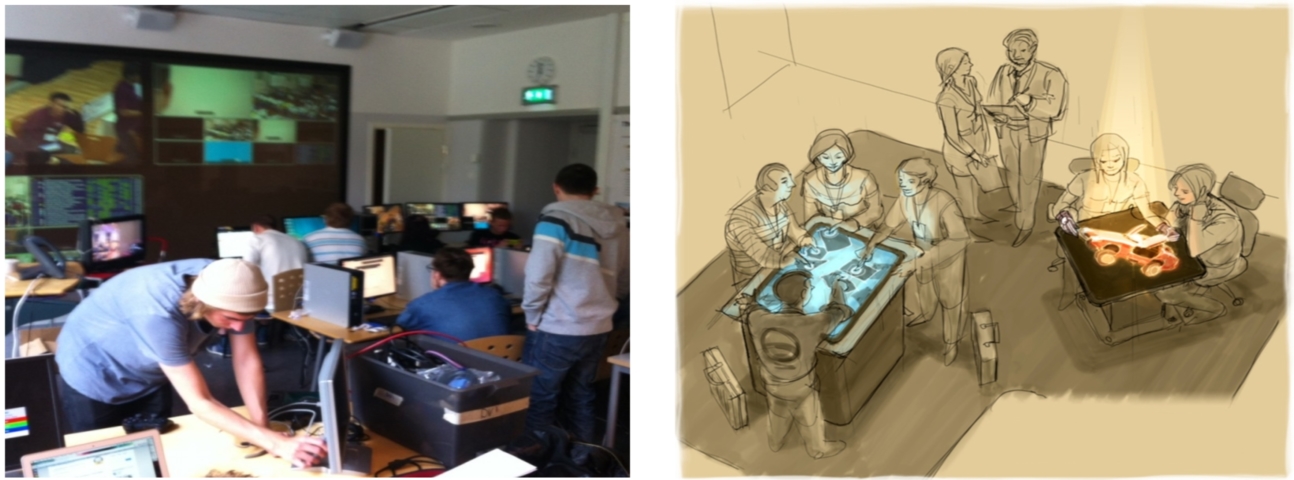Third Cycle (PhD level) Course, 6.0 hp
 |
| Interactive Entertainment Technologies (DD3336) | |
|
Third Cycle (PhD level) Course, 6.0 hp
|
|
Samples from KTH students in the
domains of 3D modelling and architecture, human skin shading,
procedural city generation and digital puppetry
|
|||||||||||||||||||||||||||||||||||||||||||||||||||||||||||||||||||||||||||||||||||||||||||||||||
Course description The video game and interactive entertainment industry is already a multi-billion dollar enterprise, with some estimates forecasting a valuation of $82 billion for the global market by 2017. At the core of these products are sophisticated real-time algorithms and infrastructures (e.g. game engines) that have foundations in domains such as computer graphics, artificial intelligence, HCI, computer science and mathematics. Entertainment technologies will continue to be decisive in pushing back technological barriers to enable new modes of interactive experience and communication and they therefore represent an important cross-over between academic and industry research. This course builds upon the Computer Game Design course DH2650, using the wider context of infrastructure (i.e. data-driven game engines and tool-chains), design and HCI to focus further on the development and application of advanced interactive entertainment technologies. It is intended for PhD students with an interest in the design and implementation (programming) of real-time interactive technologies where the end user and their experience is of paramount concern. Note: this course runs in parallel to DH2650 Computer Game Design, which is open to second cycle students.
Relevance to PhD studies Core computer games technologies, from physically-based models of fluids, gases and rigid-bodies, to interactive procedural urban environment generators and artificial behaviour routines based on human perception, represent core and complimentary themes in a host of other research domains and disciplines. In this course, PhD students will receive individual attention with respect to their specialist subject areas, increasing awareness of how their PhD work will benefit from game technologies while forming links between respective research domains. The course is primarily project-based: course participants will have great choice in their respective project direction and be facilitated by the course team in doing so, with individual meetings taking place outside seminar hours, where desired. Multi-disciplinary exploratory research and dissemination is strongly encouraged.
Previous project examples (from 2013) Augmented reality game by the Shadow Clan This augmented reality (AR) game was created by the Shadow Clan (Kalin Stefanov, Simon Alexanderson and Martin Johansson), who are a group of PhD students in the Department of Speech, Music and Hearing (TMH), CSC, KTH. It combines real-time application created in the Unity game engine and utilising real-time motion capture and object tracking. Obscurus by Daniel Nyberg Obscurus is an immersive game experience created by Daniel Nyberg using the Bitsquid game engine and uses the Oculus Rift virtual reality helmet. Daniel subsequently entered and won the prestigious CAwards! You can read more about the development of Obscurus in his blog. Composition and topics The course includes a series of themed seminars, guest lectures and practical lab and project work sessions concerning the following topics: Interactive entertainment technologies including real-time computer graphics and animation / physics / AI for AAA games, data-driven engines and game development tools, concept development, computer game history, social gaming, game rules, game experience, computer game market and business opportunities. Deliverables A central focus of the course is for the student to design, develop, implement and present an innovative interactive prototype of their choice that is founded upon solid design principles and sophisticated state-of-the-art real-time graphics and games technologies. The prototype or technologies should have relevance to the PhD topic area of the student. Course credits are awarded as follows: Laboratory work Project work Some further course details are available here. |
|||||||||||||||||||||||||||||||||||||||||||||||||||||||||||||||||||||||||||||||||||||||||||||||||
Course schedule 2014
All sessions will take place at the Visualization Studio (VIC) unless otherwise indicated (directions to reach VIC studio). Sessions will include technical and business seminars by notable speakers in the games industry. 
Links and sources
Contact chpeters (a.t) kth.se << back |
|||||||||||||||||||||||||||||||||||||||||||||||||||||||||||||||||||||||||||||||||||||||||||||||||